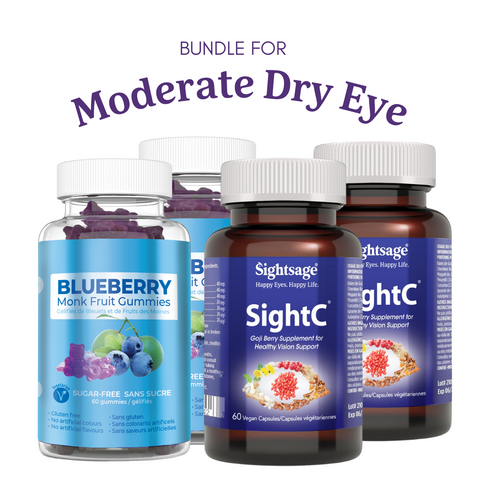Gluten and Eye Health – Is There a Link?
Stop by any supermarket and you’ll come across gluten free foods. From pasta to cookies, bread to snacks, the prominence of the gluten free label hints at the popularity of the gluten free diet.
And it’s not only people with celiac disease or gluten intolerance that go gluten free. One American study found that 65% of participants thought gluten free products were healthier.
But is that really the case? And should you be worried about gluten?
Gluten: What Is It?
Gluten is a protein that occurs naturally in some grains including wheat, rye, and barley. Gluten can also be extracted from and added to processed foods as a binding agent or to provide more protein or texture. Because of this, gluten may occur in more foods than you think, from candy and cheese to salad dressing.
Gluten can also make its way into certain foods through cross contact such as when they are harvested or processed using machinery that also handles wheat or barley.
A good example is oats. In themselves, oats don’t have gluten. But they are often grown near crops containing gluten or processed using the same facilities used to process grains with gluten. Because of this, oats product labels mention gluten as a potential allergen.
Common foods that have gluten include:
- Wheat, rye, or barley bread or pasta
- Breakfast cereals
- Bulgur wheat
- Baked goods including cookies, crackers, pies, donuts, cakes, and croissants
- Pancakes
- Candies
- Beer, ale, stout, porter
- French fries
- Vegan meat
- Malt products
- Sauces
- Gravies
- Seasoned chips and snacks
- Soups
- Bouillon
More foods in supermarkets and restaurants may have gluten than you think. Unless marked as gluten free, it’s best to check the list of ingredients on the label to be sure you’re not taking in gluten protein from an unlikely source.
Gluten Side Effects
Humans cannot completely digest gluten, but for most people, this isn’t a problem. However, undigested gluten causes an autoimmune response and unpleasant side effects in some people.
This typically occurs in celiac disease, an autoimmune condition that can damage the small intestine and lead to poor nutrient absorption.

Some people without celiac disease may experience side effects after eating gluten foods like bloating, headaches, rashes, or diarrhea. This is known as non-celiac gluten intolerance.
In recent years, gluten has also been associated with immune responses that may lead to depressive symptoms. This hearkens to the connection between the brain and the gut microbiota – the beneficial bacteria in the gut that can moderate inflammatory and autoimmune responses.
Gluten and Eye Health
Gluten can affect eye health. It can cause nutrient deficiencies, autoimmune reactions, and contribute to the development of autoimmune conditions.
Nutrient Deficiencies
Celiac disease patients are more likely to develop vitamin A, vitamin D, and other nutrient deficiencies. These deficiencies can increase the risk of retinopathy, cataracts, and dry eye disease.
For example, research shows that dry eye disease is more common in people with celiac disease.
Immune System Reactions
In some people, gluten causes an autoimmune response in the body. This can make the immune system malfunction and promote a state of inflammation.
People with a gluten immune response are more likely to develop certain diseases of the eye including uveitis and orbital myositis that cause eye pain and double vision.
Autoimmune Diseases Affecting the Eyes
Gluten is a well-known cause of autoimmune disease. Celiac disease itself increases a person’s risk of developing autoimmune diseases such as dry eye syndrome, rheumatoid arthritis, and Sjogren’s syndrome.
All these conditions can affect vision and cause chronic eye symptoms.
What About the Effects of Gluten on People Not Sensitive to It?
According to the current body of research, gluten is not inherently bad. There is not enough evidence to link gluten to health problems including eye problems in people who do not have celiac disease and non-celiac gluten sensitivity.
Humans in many parts of the world have been consuming gluten as a protein source for thousands of years. Charred remains of a flatbread made with wild wheat and wild barley have been dated to between 14,600 and 11,600 years ago.

Gluten is one of the most researched food proteins. It is possible that ongoing research may establish new links between it and eye health.
Until that happens, however, going gluten free if you don’t have celiac disease or are sensitive to gluten isn’t backed by science. What’s more, there are side effects and potential risks involved.
Gluten Free Diet Side Effects
If you have celiac disease or are intolerant to gluten, you are probably already following a gluten free diet under the supervision of a medical practitioner.
Thinking of giving up gluten for other reasons? It’s important to consider the potential drawbacks.
Wheat and rye foods are staples in many countries around the world. They are an affordable source of calories, protein, fiber, thiamin, riboflavin, niacin, and folate.
The big danger of a gluten free diet is that you may not be getting enough calories, protein, and other nutrients from your diet. Gluten free replacements can have different nutrient values than wheat, rye, or barley foods.
What’s more, gluten free alternatives are often more expensive. Switching to gluten free cooking while taking in enough nutrients can be challenging.
Keeping Your Eyes Healthy
Being sensitive to gluten can make it more difficult to get enough nutrients for your eyes through your diet. That’s where an eye health supplement can make a big difference.
SightC and Blueberry Monk Fruit Gummies provide lutein, zeaxanthin, and other key nutrients for your eyes without the gluten side effects. They are gluten free, sugar-free, and vegan. You can take them regardless of the diet you follow.
Keep your eyes healthy and happy with gluten free eye health supplements.

